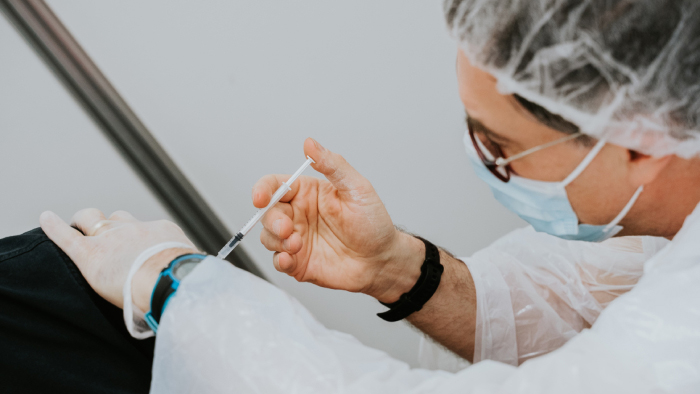In support of the Biden-Harris Administration’s We Can Do This public education campaign to increase confidence in the COVID-19 vaccines and encourage vaccination, TDW+Co, in partnership with the U.S. Department of Health and Human Services, hosted a virtual press briefing for Asian American, Native Hawaiian and Pacific Islander (AANHPI) media on Thursday, June 10.
During the virtual event, medical experts from various states provided their pandemic experiences, as well as up-to-date, trusted COVID-19 vaccine information. Special speakers included: Vice Admiral Vivek H. Murthy, MD, Surgeon General, U.S. Department of Health & Human Services; Lieutenant Adelaida M. Rosario, PhD, Office of the Surgeon General, U.S. Department of Health and Human Services; and local doctors including Joyce Javier, MD, MPH, MS, Pediatrician, Children’s Hospital, Los Angeles based in Los Angeles, CA.
In the live Q&A session, the medical experts answered questions about the safety and efficacy of the COVID-19 vaccines, health inequities for AANHPIs, and how to stay safe and protected from the coronavirus to prevent further spread.
COVID-19 has caused tremendous suffering for millions of Americans, but vaccines are giving many families and communities hope. As of June 10, the CDC reported 172 million people living in the United States are now fully vaccinated. Among this number, at least 6.1% of Asians (non-Hispanic) and 0.3% Native Hawaiian and Pacific Islander groups have had at least one vaccination, which is an estimated 6.26 million people.
“More than 300 million doses of the vaccine have been administered in the United States alone. That constitutes a tremendous amount of experience with the vaccine,” said Dr. Murthy. “And what we’ve seen is two things from all this experience. One, the vaccines remain remarkably effective in preventing COVID. And two, they also retain a very strong safety profile.”
AANHPI communities face unique challenges during the pandemic, including obtaining information about COVID-19 and the availability of the vaccines due to language barriers, a low level of familiarity with computer technology, misinformation, and a misunderstanding of the vaccines or the science behind the vaccines.
“As a scientist, the lack of disaggregated data about AANHPI populations concerns me the most,” said Dr. Rosario. “The lack of data specific to our diverse populations hide some inequities caused by socioeconomics, health, and access. As a result, our communities are unaccounted for and feel invisible.”
“There is a lot of advocacy within the Filipino community to help disaggregate the data,” said Dr. Javier. “There is the disproportionate number of Pinay nurses who have died from COVID, so we know we’re at a higher risk, but we don’t have state or federal data to back this up. This has unfortunately led to the invisibility of the needs of our community.”
The medical experts agreed following the CDC guidelines and your own physicians’ guidance to get vaccinated as soon as you can to protect your family, loved ones, and community. Everyone 12 years of age and older is now eligible to get a COVID-19 vaccination.
The CDC recommends that parents who want to protect their children and teens interested in getting vaccinated, can do it now. “Even though it’s rare for kids to get severely ill from COVID-19, they can face long-term health consequences,” Dr. Javier said. “Even if they don’t get really sick from it right now. More and more cases are being reported that young people are suffering long-term health effects of COVID-19 so that can prevent them from doing the things that they want to do in life.”
She also warns that COVID-19 has exacerbated mental health issues for children. “Prior the pandemic, emotional and behavioral health challenges have been a growing concern, especially in our Filipino community,” Dr. Javier said. “Beyond the harm caused by COVID — from uncertainty, loss of family members and increased anxiety and depression — pediatric suicidal ideation and self-harm have also been on the rise.”
Dr. Javier also confirmed that vaccines are safe for pregnant women, as well as new mothers. “Pregnant women have a higher risk of complications from COVID than they do from taking the vaccine,” she said. “The vaccine is authorized by the FDA and is not a risk to breastfeeding infants and is safe for new mothers. If you think about it, the antibodies you’re forming as a breastfeeding mother can get transferred oftentimes into breast milk to protect the child.”
The doctors shared that it is normal for people to have questions about the vaccines. However, the vaccines have been proven to be safe and effective. The doctors encouraged having a trusted conversation with those you trust.
“Getting vaccinated is our path to normalcy and is the best way to protect ourselves, our loved ones, and our community, our bayanihan,” said Dr. Javier.
In addition to Dr. Javier leading this briefing for Filipino media partners, other sessions were led by Chinese (Cantonese and Mandarin), Korean, Japanese, Native Hawaiian and Pacific Islander, South Asian, and Vietnamese physicians from around the country who provided relevant, fact-based information to address the concerns of their respective communities and increase awareness of the vaccine’s safety and efficacy.

For More Information on Vaccines
Make sure to consult with your health practitioner before getting any vaccine. If you are looking for additional resources, turn to your trusted local leaders. If you have access to the Internet and are able to search for information online, visit trusted sources like the CDC, visit vaccines.gov or text your ZIP code to 438829 to find vaccines near you. Together, we can do this.
About We Can Do This
The HHS COVID-19 public education campaign (wecandothis.hhs.gov) is a national initiative to increase public confidence in and uptake of COVID-19 vaccines.
Media Contact: Stella Hill
pr@tdwandco.com | 213-718-7617






